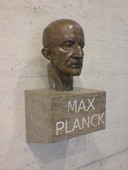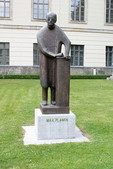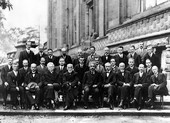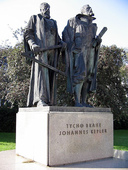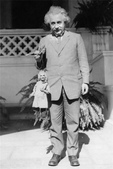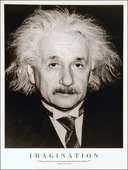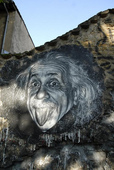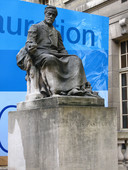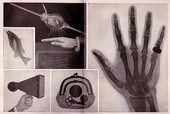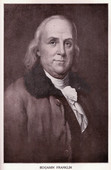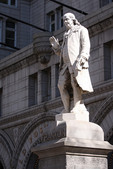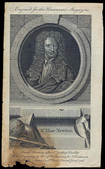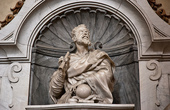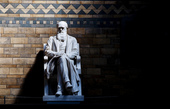1.
Karl Ernst Ludwig Marx Planck (April 23, 1858 – October 4, 1947) was a German physicist who is considered to be the founder of quantum theory, and one of the most important physicists of the twentieth century.
6.
First modern Astronomer, he detected that the Earth and the Sun are not in the center of the universe. He calculated the orbits of the planets.
7.
German-born American theoretical physicist whose special and general theories of relativity revolutionized modern thought on the nature of space and time and formed a theoretical base for the exploitation of atomic energy. He won a 1921 Nobel Prize for his explanation of the photoelectric effect.
8.
Comments:
Pasteur proved that life always needs life to start with. Therefore the theory of evolution must be wrong. 150 years of scientific research since Pasteur have testified this.
Darwins work had nothing to do with abiogenesis, Pasteur's work does not contradict evolution in any way.
10.
Wilhelm Conrad Röntgen (27 March 1845 – 10 February 1923) was a German physicist, who, on 8 November 1895, produced and detected electromagnetic radiation in a wavelength range today known as x-rays or Röntgen rays, an achievement that earned him the first Nobel Prize in Physics in 1901.
11.
13.
14.
English mathematician and scientist who invented differential calculus and formulated the theories of universal gravitation, terrestrial mechanics, and color. His treatise on gravitation, presented in Principia Mathematica (1687), was supposedly inspired by the sight of a falling apple.
15.
was a German theoretical physicist. He devoted a large portion of his life to the pursuit of his unified field theory, his theory of everything.The loss of his hands and serious diminution of his eyesight apparently resulted in Heim acquiring an eidetic, acoustic memory. He was claimed to rarely forget a formula if he heard it recited, and was said to be able to learn a language in a matter of days.
18.
21.
22.
Danish physicist who won a 1922 Nobel Prize for investigating atomic structure and radiations.
23.
Most influential mathematician of 19th century. Creator of the non-Euclid geometry.
24.
26.
Italian natural philosopher, astronomer, and mathematician who made fundamental contributions to the sciences of motion, astronomy, and strength of materials and to the development of the scientific method.
27.
30.
Greek mathematician, engineer, and physicist. Archimedes discovered formulas for the area and volume of various geometric figures, applied geometry to hydrostatics and mechanics, devised numerous ingenious mechanisms, such as the Archimedean screw, and discovered the principle of buoyancy.
31.
Russian physiologist, nobel prize winner (1904). His scientific discoveries: reflex system, classical conditioning, behavior modification, orienting response.
34.
35.
37.
NICARAGUAN ALCHIMIST AND THEORICIST, WHO DEFINES LIFE AS A GAME
OF RETHORIC METAPHOR IN ITS INTRINSIC VIUW OF IDEAS AND SUBSTANCE
ABSTRACCION TO MANIFEST SENCE, AND ALLEGORIC INFLUENCE IN OUR
DAILY LIFE. HE UNIFIED QUANTUM PHISICS TO OUR EXPERIENCE IN THE
CONCIUOS MIND TO IDENTIFY QUANTUM TRUTH IN EVERYBODY'S DREAM
THRUGH THE INFLUENCE OF SYNCHRONICITY AND DNA EVOLUTION.
39.
40.
46.
48.
49.
52.
The father of biology. and made great advances in optics. besides having great insight in to the workings of nature he also put the sciences in to categories that we still you use today.
55.
Ali Mehmet Celâl Şengör (born March 24, 1955) is a Turkish geologist. He is currently on the faculty at Istanbul Technical University, Department of Geological Engineering. He got his PhD at the State University of New York, Albany in 1982. He also writes weekly popular science columns in center-left daily Cumhuriyet. He is married with one child.
Since 2004, Professor Şengör is a (foreign) member of The American Philosophical Society and United States National Academy of Sciences.
58.
Emmy Noether is best known for her contributions to abstract algebra, in particular, her study of chain conditions on ideals of rings.
59.
Viktor Schauberger (1885-1958) made an extraordinary contribution to knowledge of the natural world. He was nd still is the Ambassador of Nature.
61.
Greatly contributed to science by completing the world's most important theories of calculus and quantum physics...Psychologist, Chemist, Astronomer, Physicist....
63.
Mathematician, New Age philiosphy) Unified Field Theory,Known primarily for his work on Super String Theory, Black Holes and multiple Big Bang.His works include Methodological Frame of the Field and LL.B,London Mathematical Society. Entire Cambridge University, UK was taken by a storm and the entire language of the prestigious CERN project changed in 2006 under the influence of his work.
Comments:
The coincidence point theory and complete makeover of V spin in the IR and UV regime has brought in quantum loop gravity and the transform by gravitational spin as a very fundamental contribution to mathematical physics with far reaching consequences in Methodological Frame of the field. The inequalities worked out in LL.B have again lead to massive rethink. One of the biggest mathematician of our times.
67.
American astronomer noted for research on the possibility of extraterrestrial life and for speculation on the severity of a nuclear winter.
68.
Scottish-born American audiologist best known as the inventor of the telephone (1876).
Comments:
The inventor of the telephone was Philip Reis in 1862. Graham Bell made modifications 13 years later with the help of a model of Reis. Interesiting story that he succeeded to gain fame instaed of Reis, since Reis supplied the US already 1862 with his telephones. May be this has to do with the isolation of islands.
why, at the same time the German Philip Reis also invented the telephone
69.
70.
Best known for study and nature of black holes and theoretical cosmology. Won Wolf Prize (1988), Prince of Asturias Award (1989), Copley Medal (2006), and Presidential Medal of Freedom (2009).
73.
77.
97.
99.
the most cited alive scientist today: linguistics, logic, cognitive psychology, political science etc.
100.
Prominent Yugoslav Geologist. Proposed nomination for the Ice Age Theory, explanation of variation in Earths orbit and proof of variations in Climate Change (Milankovitch cycles). Two craters on the Moon and Mars is named for him as well as a minor planet (1605 Milankovitch)
Similar Top lists
| Category | Ranked | Added by | |
|---|---|---|---|
| Best Science and History Museums | Science | 29 items | JARM |
ShareRanks is about ranking things that are top, most, greatest, or even worst in all categories.
Use arrows to rank one item in versus another.
Use arrows to rank one item in versus another.
Top 10 Best Scientists are especially marked











